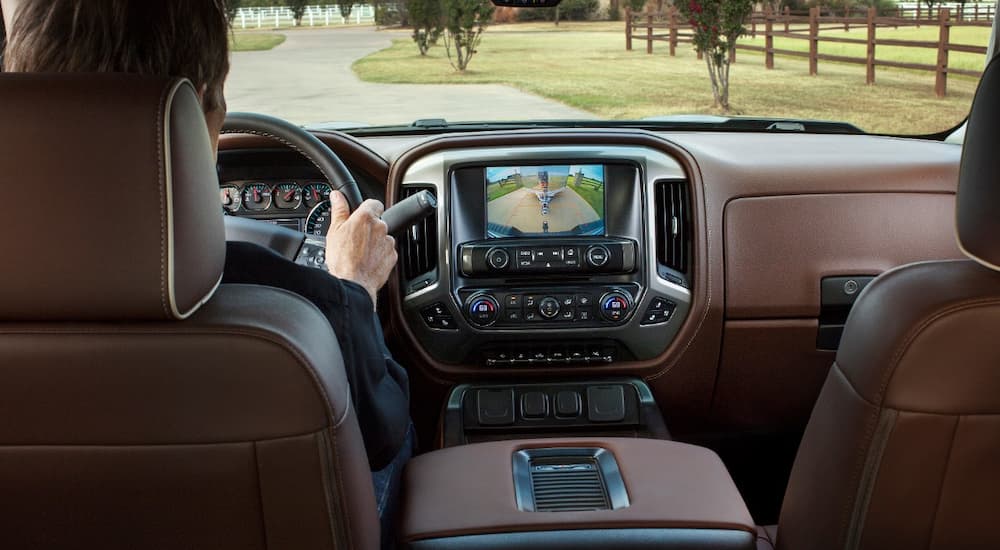You’re in the market for a new vehicle, but there’s an age-old question that you can’t find the answer to online. What’s more important in a used vehicle––age or mileage? Unfortunately, the question has polarizing responses, and it’s not an easy one to answer. But before you head over to your local Chevy dealership, we’re here to show you why there might not be a debate at all. Age and mileage are equally important when purchasing a used vehicle, both offering unique advantages and disadvantages.
The Age Debate
If the age of a vehicle doesn’t merit consideration, then why do automakers offer Certified Pre-Owned models that must meet specific age requirements before earning their certified sticker? Because not every vehicle is made or driven the same. While this answer seems obvious, there’s a bit more to it than what meets the eye.
Advancements in the automotive industry mean that cars, trucks, and SUVs are built better than ever before. As a result, vehicles are spending more years in their prime. For example, the S&P Global Mobility Reports reveal that the average car in America in 2021 was over 12 years old. That’s a new high for the country and reflects that vehicles are made to run longer.
So, if cars are built better, why is age an important factor when buying a vehicle? While a car may be extremely well built and made to last, how it’s driven plays a prominent role in its longevity. A 12-year-old car that spent a decade navigating rush-hour traffic in the city has endured far more extensive wear than a 17-year-old SUV that’s spent the same amount of time on the highway. The frequent stop-and-go traffic takes a heavy toll on a vehicle, causing it to age faster.
The Mileage Debate
How many miles do you put on your vehicle each year? In 2019, the Federal Highway Administration reported that the average car owner in America logs 14,300 miles on their vehicle each year. At this rate, your vehicle will have over 71,000 miles on the odometer before it’s truly reached its prime. So does this mileage mean that it’s no longer a good car or can’t perform well? Not at all.
While Certified Pre-Owned programs set mileage limitations, the industry doesn’t have a hard and fast rule as to what it deems high mileage. This makes the mileage debate an even vaster gray area, especially when you consider automakers like Toyota and Honda, which are renowned for building vehicles that can log hundreds of thousands of miles with ease. So, where does that leave your search?
When looking at a used car, mileage is important to consider in relation to the make and model because some brands and models last longer than others. As with age, it also depends on how the vehicle was driven. For example, a truck with 100,000 highway miles is often in better shape than a sedan with 100,000 in-town miles with frequent stops.

Weighing the Pros and Cons
There’s no real way to settle the debate because age and mileage are both significant in your search for a used car. However, weighing the pros and cons of each option is a great way to sharpen your focus to find the best model for your needs and make the smartest financial investment. So, what are the advantages and disadvantages of each? Let’s find out.
Age Pros and Cons
Pros
- The older the vehicle, the lower the price.
- Advancements in the industry mean vehicles are aging better than ever, which means finding your dream car at a fraction of the price.
- Sites like CARFAX are helping eliminate the risk of buying used vehicles by providing detailed vehicle history reports.
- Younger vehicles may still be covered by the manufacturer’s new vehicle warranty.
- Younger vehicles are usually more efficient and better equipped with advanced connectivity, safety, and driver-assist features.
Cons
- The older the vehicle, the older the technology and safety features.
- Maintaining a vehicle plays a crucial role in its longevity, and acquiring this information (service records, maintenance history, etc.) on an older model may be difficult.
- Older vehicles are likely no longer covered by a warranty, making repairs expensive unless you purchase an extended warranty.
Mileage Pros and Cons
Pros
- Vehicles with high mileage are typically priced lower.
- Lower mileage vehicles may still be covered by the new vehicle warranty.
- Vehicles are built to last longer and log more miles with ease, which makes shopping for a used vehicle more enticing even if it has high mileage.
Cons
- It’s hard to determine where the miles were logged, meaning you won’t know if it’s been primarily driven in town or on the highway.
- Vehicles with high mileage are likely no longer covered by a warranty, so any repairs are your responsibility.
- There’s no industry standard as to what’s considered “high” mileage.

Other Factors to Consider
As you can see, settling the age vs mileage debate is no easy task because there’s no clear or obvious answer. However, there are several factors that you should consider apart from the age and mileage of a vehicle. The most important of these factors are maintenance history and technology.
Maintenance History
Think about your health and how eating a balanced diet, routinely exercising, and getting proper medical care contribute to a longer, more fulfilling life. The same is true for a vehicle. Cars, trucks, and SUVs need routine maintenance to operate their best and extend their longevity. This is why a vehicle’s maintenance history is vital to consider before finalizing the purchase.
For example, a truck that’s five years old with over 100,000 miles may be an excellent investment because its previous owner was meticulous about its maintenance. You know this because the vehicle comes with a detailed list of its routine maintenance and repairs, leaving no question of its reliability. Now, let’s say that you find a truck that’s five years old with 75,000 miles and has no maintenance history to speak of. It’s had multiple owners, but that’s all you know from the vehicle history report. What model gives you more confidence in your investment?
Technology
Technology may not be high on your priority list, but it’s an essential consideration in your search because it extends beyond conveniences like smartphone integration and navigation to tools designed to enhance your visibility and safety. This technology includes everything from stability and traction control to cruise control, automatic high beams, and backup cameras. Depending on the age of the model, you’ll find this technology is vastly limited, especially if it was built before industry standards like rearview cameras and automatic emergency braking.
Age or Mileage: Where Should Your Focus Go?
The ongoing debate as to whether a vehicle’s age or mileage matters more is not an easy one to settle because, as you can see, it involves far more than what’s on the odometer and the year the vehicle was built. It requires diving deeper into the vehicle’s history to learn more about where it spent its time and logged its miles. It also means looking closely at its maintenance history, a telltale sign of how it operates and the life it has left to give.
So, when you venture to your local Chevy dealer, consider these factors. Then, weigh the pros and cons of each situation, carefully looking at the model with objectivity. You may even find hiring a mechanic for a quick inspection will answer all the questions you need before finalizing the deal or walking away.



